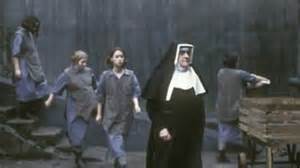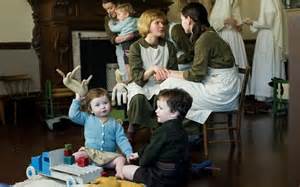“I certify that I have handed over my (child) to custody… I solemnly promise that I shall never interfere with (him/her) in any way in future.”
Such signed statements served to sever the rights of thousands of unwed young mothers in Ireland starting in the 1950s. These young ladies, many disowned from their families, had been sent to live in convents because of the sin and shame of an out-of-wedlock pregnancy and had no choice in signing authority over to the nuns.
Likewise, the girls were forced to stay at the workhouses, even after delivering the babies, working in the laundries, kitchens or fields as pentance, with just a short amount of time each day with their children. All the while the nuns were quietly arranging over-seas adoptions, selling the children to Americans, with no regard to the natural bonding occuring between mother and child.
Philamena Lee was one of those mothers. The real-life lady behind journalist Martin Sixsmith’s book The Lost Child of Philamena Lee and Judi Dench’s role in her Oscar-worthy performance in the movie: Philamena.
If you are familiar with either, you know that Philamena privately grieved the loss of her son for 50 years before finally confiding in her grown children the secret of their half-brother. While the order of real life events is slightly altered for the silver screen, my purpose in writing about it is not plot detail, but to draw attention to the shame she suffered.
Obviously I am not condoning teen pregnancy, but the way Philamena was treated led to the loss of her family’s love, the loss of her son and the loss of her faith (though that is not accurately accounted for in the movie but a fact I learned in an interview she gave.)
What happened to hate the sin, love the sinner?
Do we really love the sinner?
Do we even know how?
Too often I think we justify not reaching out in love or we dismiss someone because we don’t want to be assosiated with “those” sinful people. I am not just talking about out-of-wedlock relations, but anyone with different beliefs, lifestyle or behavior.
Jesus ate with sinners. Jesus came for sinners. And the law-abiding Pharisees were appalled. But this is what Jesus said to them:
“Now then, you Pharisees clean the outside of the cup and dish, but inside you are full of greed and wickedness. You foolish people! Did not the one who made the outside make the inside also? But now as for what is inside you—be generous to the poor, and everything will be clean for you.” Luke 11:39-41
Are we so foolish to think we are sinless and not without the same need for Christ to make us clean? No matter how much behaving rightly or “good” we do, we all have hidden motives, idolatrous hearts and will never perfectly love God and others as we are called. Until we see this, see that we are all sinners in the same boat, then we will never extend grace and mercy to others. We will never build a rapport and be able to effectively enter in to help.
Christians talk big about “being a witness” for Christ. But who is it we are witnessing about- our goodness or His?
As long as we think we can live the perfect life, we are no different from the Pharisees and will keep others in their shame. But when we see with unveiled faces how desperately we too need a Savior, then we have a hope to offer to those who feel as Philamena did…hope in the One who took all our shame and nailed it to the cross so that we could be free from it!
Other posts in my series spun from Oscar nominated movies: The Book Thief, The Lone Survivor, August: Osage County. Don’t want to miss any post? Enter your email on the upper right-hand column after “Follow blog via email”.




So bless are today too that be witness for Christ and be thankful for victory from sin in Jesus name and be sowing our seed in faith to glory for God in hope to reap later big harvest ,thanks and bless and pray,keijo sweden
Amen and thank you!